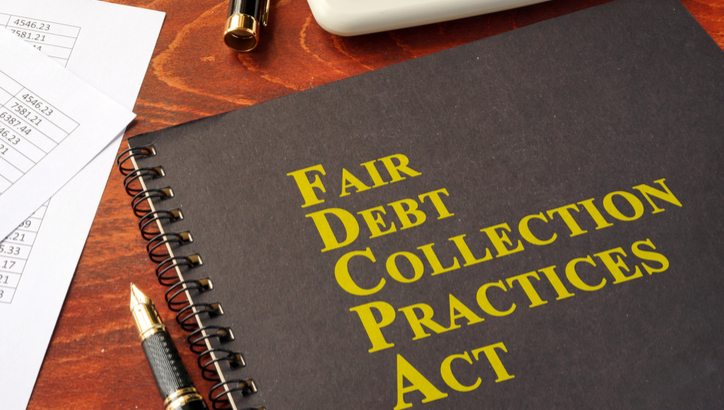St. Louis FDCPA Lawyers
Missouri FDCPA Attorneys

If you are being harassed by collectors, it is important to know that you have rights.
The Fair Debt Collection Practices Act, commonly referred to as the FDCPA, prohibits all forms of unfair, abusive, and deceptive collection practices.
In spite of federal and state law, debt collectors continue to abuse consumers in order to unfairly pressure them into paying debts. These abuse tactics are often intended to scare or intimidate consumers, sometimes with threats of violence or arrest.
Other debt collectors pile on illegal interest or fees to make the debt seem larger than it actually is. In some instances, these debts are time-barred, discharged in bankruptcy, or not owed for other reasons.
At Halvorsen Klote, our attorneys sue collections agencies that violate federal law. We represent clients throughout the country in Fair Debt Collection Practice Act (FDCPA) claims and other debt and collection law matters. We do not represent creditors or corporations. We only represent individuals. Our lawyers are committed to defending clients against harassment from creditors and debt collectors.
Protecting Clients Against Fair Debt Collection Practices Act Violations
Though the FDCPA is a very technical statute and there are hundreds of ways that the statute can be violated, we have listed some of the most common violations for your convenience.
Talk to a lawyer from our firm as soon as possible if you're being harassed. Here are some of the typical FDCPA violations our clients encounter:
- Call you before 8am.
- Call you after 9pm.
- Call you at work more than once.
- Call third parties (the only person debt collectors can contact on multiple occasions apart from you is your spouse if you have one) more than once to try to locate you.
- Tell anyone else (apart from your spouse) that the collector is trying to collect a debt from you.
- Contact you after you have written to the debt collector and asked them not to contact you (there are more effective ways of doing this than merely sending a letter – for more information contact Halvorsen Klote today).
- Try to collect on a debt that is not valid (you would be surprised to know that this happens very frequently}.
- Debt collectors cannot lie to you or use deceptive methods in trying to collect a debt (this can encompass a lot of situations).
- Leave a message on an answering machine without saying that the collector is trying to collect a debt; they must leave their name and their company.
- Sue or even threaten to sue on a debt that is outside of the Statute of Limitations.
- Say or imply anything about arrest, going to jail, or the like.
- Threaten to sue you when the collector has no intention of doing so (this usually happens when you have been given a deadline to do something (usually make a payment) and if the deadline goes and they have not sued you, that is a violation).
- Threaten to garnish your wages without explaining that first the creditor must file suit and get a judgment.
- Say or imply anything about taking cars, furniture, or any other property and putting liens against your property – again a debt collector has to first sue you and obtain a judgment against you before it can do this.
- Sue you on the debt in a different location, except a) where you live now or b) where you entered into the debt agreement.
- Embarrass you by saying things like: “You are a deadbeat; why don’t you pay your bills; you are a disgrace; why don’t you get rid of your spending spouse.” The list goes on.
- Use profane or other abusive language.
- Shout, scream, or get angry with you.
- Give the impression that the caller or his company has some connection with the government, the courts, the police, other law enforcement, etc.
- Try to collect the wrong amount: add small fees, for instance.
- Threaten to deposit a post-dated check, particularly when the collector knows you do not have the money to cover the check.
- Call you repeatedly. A call a week is OK. More than one call a week is harassment. Certainly more than one call in the same day is an abuse, particularly if you hang up and the collector calls right back.
- Call you or anyone else (looking for you), after the collector knows you have an attorney.
- Ask you to pay more than you owe.
- Ask you to pay interest, fees, or expenses that are not allowed by law.
- Call at times the collector knew or should know are inconvenient.
- Use or threaten to use violence if you don’t pay the debt.
- Threaten action they cannot or will not take – an example of this is when the statute of limitations has passed and they threaten you with a lawsuit when that it is not a remedy to the collector at law.
You do not have to tolerate creditor harassment. You have rights, and our attorneys can help you! We sue debt collectors for violating our clients’ rights. With decades of combined experience and knowledge in protecting clients from debt collection harassment, we will take an aggressive approach to get you the results you need. Even if you have experienced some type of harassment not listed here, there is a strong chance you still have a claim. Our lawyers know the law and we can determine whether you have a viable case.
Contact Us ∙ No Up Front Fees ∙ No Cost Unless We Win
We offer free initial consultations and take claims on contingency, so you will not have to pay at all unless we win. If you have experienced any of the violations listed above, or believe a debt collector may have violated the law, contact Halvorsen Klote immediately at 1-877-51-HKLAW (877-514-5529) or email us.



